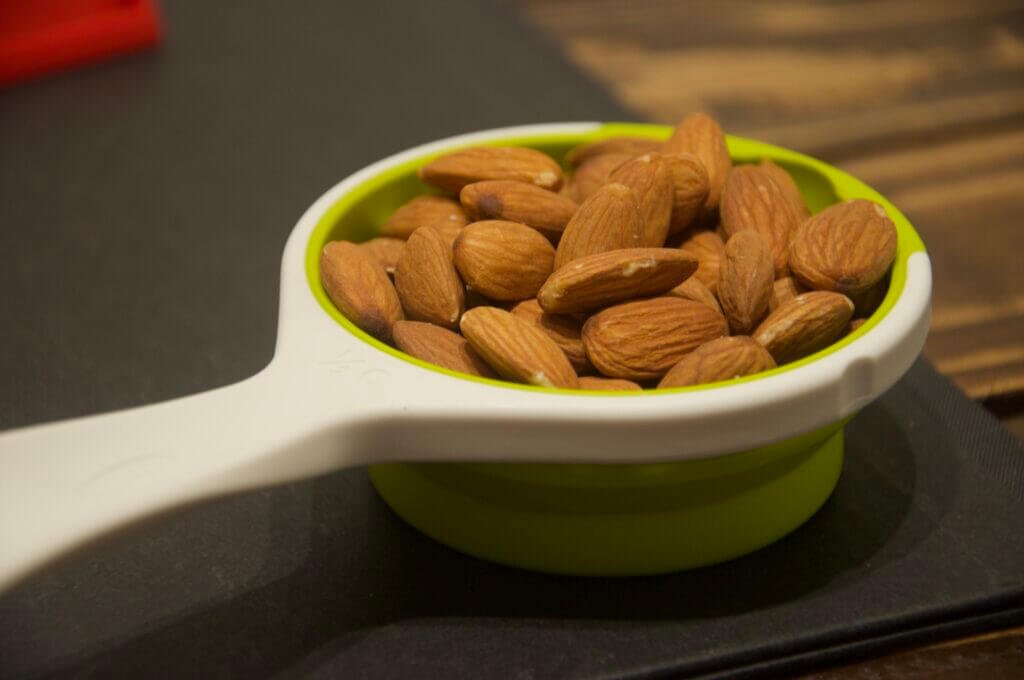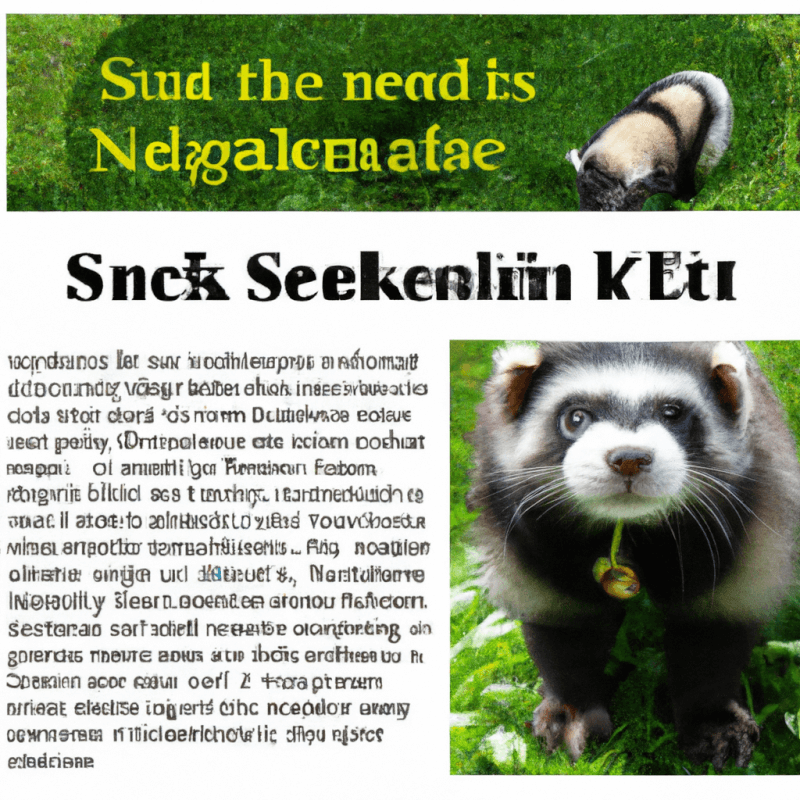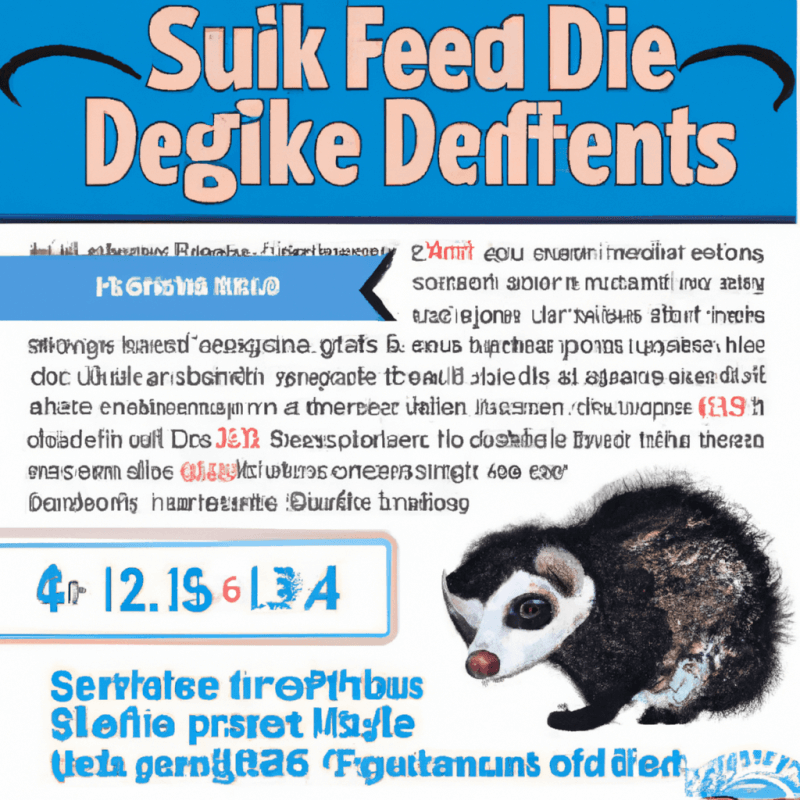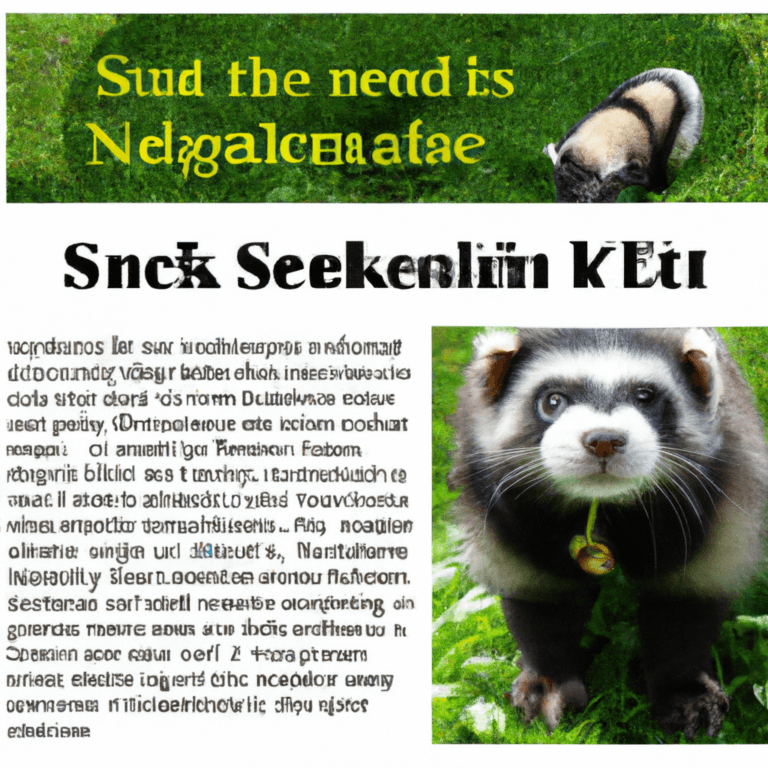Feeding your pet skunk requires careful consideration to ensure their health and well-being. With their unique dietary needs in mind, it’s essential to provide a balanced and nutritious diet. While skunks enjoy a variety of foods, their primary diet should consist of high-quality, protein-rich cat or dog food. Additionally, adding fresh fruits, vegetables, and insects can provide the necessary vitamins and minerals they need. Remember to avoid foods that are toxic to skunks, such as grapes, onions, and chocolate. By offering a well-rounded and appropriate diet, you can keep your pet skunk happy and healthy.
Protein Sources
Skunks are omnivores, which means they require a balanced diet that includes protein. Here are some protein sources that are suitable for your pet skunk:
Ready for Cat Trivia?
Test your knowledge about cats!

Meat-based diets
One of the primary protein sources for skunks is meat. You can feed your skunk lean and appropriately cooked meats such as chicken, turkey, and lean cuts of beef. It is crucial to ensure that the meat is boneless, as bones can pose a choking hazard. Remember to remove any skin or excess fat before feeding it to your skunk.
Commercial skunk food
There are specially formulated commercial skunk foods available in the market that provide a balanced protein source for your pet. These diets are usually formulated with high-quality ingredients that meet the nutritional requirements of skunks. It is recommended to choose reputable brands that have a history of providing reliable and scientifically formulated skunk diets.
Insects and worms
Skunks have a natural instinct for hunting insects and worms in the wild. You can offer your pet skunk a variety of insects such as crickets, mealworms, and earthworms. These small creatures not only provide protein but also serve as a mental stimulation for your skunk. Make sure to source the insects from reliable suppliers and ensure they are free from pesticides or other harmful substances.
Eggs
Eggs are another excellent protein source for skunks. You can provide your pet skunk with scrambled eggs or boiled eggs. However, it is important to cook the eggs thoroughly to eliminate any risk of salmonella. Additionally, remove the eggshell before serving as it can cause digestive issues. Eggs are a nutritious and easily digestible protein option for skunks.
Fish
Fish, such as salmon or trout, can be included in your skunk’s diet as a protein source. Fish provides essential omega-3 fatty acids, which are beneficial for your pet’s overall health. It is recommended to cook the fish thoroughly and remove any bones to prevent choking hazards. Fish can be a great addition to your skunk’s diet, but ensure it is not the sole protein source as variety is key for a balanced diet.
Fruits and Vegetables
In addition to protein, skunks require a variety of fruits and vegetables to meet their nutritional needs. Here are some guidelines to follow when incorporating fruits and vegetables into your skunk’s diet:
Variety of fruits
Include a variety of fruits in your skunk’s diet to provide them with essential vitamins and minerals. Some suitable fruit options include apples, bananas, blueberries, and strawberries. However, it is important to remember that fruits should be given in moderation as too much sugar can be harmful to skunks. Offer small pieces of fruit as occasional treats or mix them with other foods.
Leafy vegetables
Leafy greens are a great source of fiber and other essential nutrients. You can include vegetables like spinach, kale, and Swiss chard in your skunk’s diet. These vegetables can be served raw or lightly steamed to retain their nutritional value. Ensure you wash the vegetables thoroughly to remove any pesticides or dirt before feeding them to your skunk.
Root vegetables
Root vegetables can be added to your skunk’s diet to provide variety and additional nutrients. Carrots, sweet potatoes, and beets are good options. These vegetables can be grated or cut into small pieces for easy consumption. Remember to cook the root vegetables before feeding them to your skunk to improve their digestibility.
Avoid toxic plants
It is crucial to avoid feeding your skunk any toxic plants or foods that can be harmful to their health. Some common toxic plants for skunks include avocados, onions, grapes, and chocolate. These foods can cause serious health issues if ingested by your skunk. Always research any new food item before offering it to your pet and consult with a veterinarian if you are unsure about its safety.

Grains and Carbohydrates
While protein and fruits/vegetables are important, grains and carbohydrates should be included in your skunk’s diet in limited quantities. Here are some guidelines to follow:
Limited quantity of grains
Grains should be a small portion of your skunk’s diet as they are not a natural part of their wild diet. You can include small amounts of whole grains such as cooked brown rice or quinoa. These grains provide some carbohydrates and fiber but should not make up the majority of the diet.
Healthy carbohydrates
Including healthy carbohydrates like sweet potatoes and peas can provide some energy to your skunk. These carbohydrates are also a good source of fiber and can aid in digestion. However, it is important to monitor the amount of carbohydrates your skunk consumes to prevent excessive weight gain.
Avoid sugary foods
Skunks have a natural tendency to develop insulin resistance and obesity, so it is crucial to avoid feeding them sugary foods. This includes fruits with high sugar content, processed treats, or any foods containing added sugars. Excessive sugar intake can lead to health complications, including diabetes, in skunks. Stick to low-sugar options and natural sources of carbohydrates to maintain a healthy diet.
Supplements and Vitamins
To ensure your skunk receives all the necessary nutrients, you may consider providing them with certain supplements and vitamins. Here are some considerations to keep in mind:
Supplementing with taurine
Taurine is an essential amino acid that plays a vital role in the overall health of skunks. Commercial skunk diets often contain adequate levels of taurine. However, if you are feeding a homemade or raw diet, it is important to consult with a veterinarian about supplementing with taurine. Taurine deficiency can lead to serious health issues in skunks.
Consulting a veterinarian
It is always recommended to consult with a veterinarian who is knowledgeable about skunks’ nutritional needs. They can guide you on the specific dietary requirements of your pet skunk based on their age, weight, and overall health. A veterinarian can also recommend appropriate supplements or vitamins if needed.
Vitamins and minerals
Skunks require a balanced intake of vitamins and minerals to maintain their overall health. A well-rounded and varied diet including protein, fruits, vegetables, and whole grains can provide many essential nutrients naturally. However, if your skunk’s diet is lacking in certain vitamins or minerals, your veterinarian may recommend specific supplements to meet their nutritional needs.

Water and Fluid Intake
Proper hydration is vital for your skunk’s overall well-being. Here are some guidelines to ensure your pet skunk gets enough water:
Providing fresh water
Make sure to provide your skunk with fresh, clean water at all times. It is important to change the water daily and regularly clean the water dish to prevent contamination. Skunks can be picky when it comes to water, so offering both a water dish and a bottle can give them options to drink from.
Avoiding sugary drinks
Avoid giving your skunk any sugary drinks or flavored beverages. Skunks may be attracted to sweet tastes, but these drinks can have adverse effects on their health. Stick to plain, fresh water to ensure your skunk stays properly hydrated.
Water dishes and bottles
Offering your skunk both a water dish and a bottle can help cater to their preferences. Some skunks may prefer drinking from a dish, while others may prefer drinking from a bottle with a sipper tube. Monitor their drinking habits and ensure they have easy access to water in whatever form they prefer.
Feeding Schedule
Establishing a regular feeding schedule is essential for your skunk’s overall health and well-being. Here are some guidelines to follow:
Consistency in meal times
Skunks thrive with a consistent routine, so it is important to establish regular meal times. Stick to a feeding schedule that works for both you and your skunk. Aim for two or three meals a day, depending on your skunk’s age and individual needs.
Understanding skunk’s metabolism
Skunks have a unique metabolism that requires a balance between their nutritional intake and energy expenditure. It is important to provide them with enough food to satisfy their energy needs without overfeeding them. Take into consideration your skunk’s age, activity level, and overall health when determining the appropriate portion sizes and feeding frequency.
Monitor food intake
Keep an eye on your skunk’s food intake to ensure they are eating enough but not too much. Skunks are prone to obesity, so it is best to measure their food portions and avoid free-feeding. Regularly assess your skunk’s body condition and consult with a veterinarian if you have any concerns about weight management.

Feeding Guidelines for Different Age Groups
Skunks have different nutritional needs at different stages of life. Here are some feeding guidelines to consider for different age groups:
Feeding baby skunks
Baby skunks, also known as kits, have unique nutritional requirements. They rely on their mother’s milk for the first few weeks of their life. If you are caring for orphaned or hand-raised kits, it is crucial to consult with a veterinarian who can guide you on the appropriate milk replacement formula. As the kits transition to solid foods, gradually introduce them to a balanced diet consisting of commercial skunk food, minced meats, and soft fruits and vegetables.
Nutritional needs of juvenile skunks
As skunks grow into juveniles, their nutritional needs evolve. At this stage, it is important to provide them with a balanced diet that includes a variety of protein sources, fruits, vegetables, and grains. Ensure proper portion sizes and monitor their weight to prevent overfeeding or obesity.
Adult skunk diet
Adult skunks require a varied and balanced diet to maintain their health. Aim for a combination of protein sources, including lean meats, commercial skunk food, and occasional eggs or fish. Include a variety of fruits and vegetables in their diet, while limiting grains to a small portion. Regularly assess their body condition and adjust their diet accordingly.
Senior skunks
As skunks age, their metabolism and activity level may change. Senior skunks may require fewer calories and a more tailored diet to accommodate any health issues or decreased mobility. Consult with a veterinarian who can guide you on the appropriate diet for your aging skunk and address any specific nutritional needs they may have.
Health Considerations
Maintaining your skunk’s health is of utmost importance. Here are some health considerations when it comes to their diet:
Preventing obesity
Skunks are prone to obesity, so it is essential to prevent overfeeding and monitor their weight regularly. Avoid high-calorie treats and unhealthy table scraps. Stick to a balanced and portion-controlled diet to ensure your skunk maintains a healthy weight.
Balancing nutritional intake
Aim for a balanced diet that includes adequate amounts of protein, fruits, vegetables, and whole grains. Providing a variety of foods helps ensure your skunk receives all the necessary nutrients. Consult with a veterinarian who can assess your skunk’s dietary needs and recommend any necessary adjustments.
Monitoring weight
Regularly monitor your skunk’s weight and body condition. Weight gain or loss can be an indicator of underlying health issues or imbalanced nutrition. If you notice any significant fluctuations in weight or appetite, consult with a veterinarian for a proper evaluation.
Common health issues
Skunks can be susceptible to certain health issues, such as dental problems, digestive disorders, and metabolic disorders. Providing a well-balanced diet and regular veterinary check-ups can help prevent or manage these issues. If you notice any signs of illness or discomfort, seek veterinary attention immediately.

Food for Enrichment and Mental Stimulation
Besides providing nutrition, food can be used to enrich your skunk’s life and engage their natural instincts. Here are some ideas for food-based enrichment:
Food puzzles and toys
Food puzzles and interactive toys can be a great way to keep your skunk mentally stimulated while they eat. These toys engage their natural foraging instincts, allowing them to work for their food and providing mental stimulation. Look for puzzle toys specifically designed for small animals and fill them with treats or small pieces of their regular food.
Foraging opportunities
Create foraging opportunities for your skunk by hiding small amounts of food around their enclosure or in specially designed foraging toys. This mimics their natural behavior of hunting and searching for food, promoting mental stimulation and reducing potential boredom.
Important Considerations
When it comes to feeding your pet skunk, there are some important considerations to keep in mind:
Veterinarian consultation
Always consult with a veterinarian who is experienced in skunk care when determining the dietary needs of your pet skunk. They can provide valuable guidance specific to your skunk’s age, health, and individual needs.
Avoiding toxic foods
Take extra caution to avoid feeding your skunk any toxic foods or plants. Some common foods, such as avocados, onions, grapes, and chocolate, can be harmful or even fatal to skunks. Ensure you research any new food item thoroughly before offering it to your pet.
Regular monitoring
Regularly monitor your skunk’s diet, weight, and overall health. Keep track of what they eat, any changes in appetite or behavior, and their body condition. This information can help you detect any potential issues early and make necessary adjustments to their diet or seek veterinary care if needed.
Varied and balanced diet
Offering a varied and balanced diet is key to meeting your skunk’s nutritional needs. Providing a combination of protein sources, fruits, vegetables, and limited grains helps ensure your skunk receives all the necessary nutrients. Remember, balance and moderation are crucial in maintaining your skunk’s overall health.
Feeding your pet skunk properly is essential for their well-being. By following these guidelines and consulting with a veterinarian, you can provide your skunk with a nutritious and balanced diet that meets their specific needs. Remember to monitor their health regularly, engage them with food-based enrichment, and offer the love and care they deserve.



